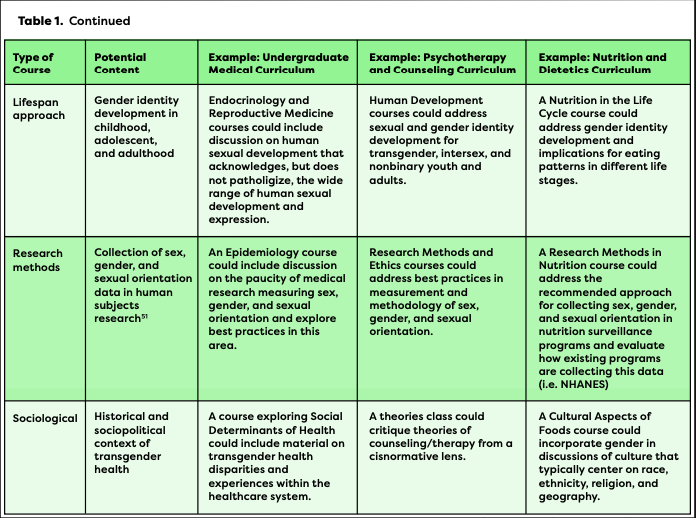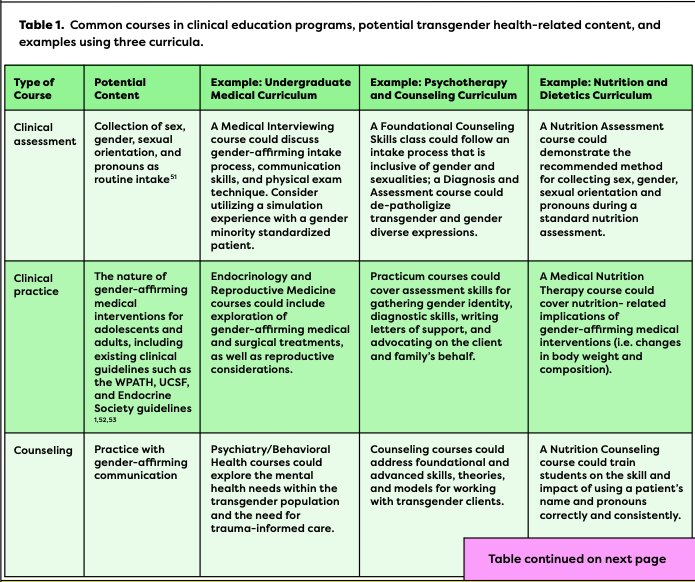FIRST ON THE DAILY SIGNAL: St. Louis University’s Transgender Health Collaborative is pushing a toolkit on “transgender health” intended to influence students of medicine to embrace ideological understandings of gender and sexuality.
Published in November 2022, St. Louis University’s toolkit is a collaborative effort of the university’s Transgender Health Collaborative as well as Metro Trans Umbrella Group, a nonprofit group for “transsexuals (FtM, MtF), genderqueer, androgynous, agender, intersex, drag, and questioning” that directs trans-identifying individuals to pro-trans therapists and “medical resources.”
The toolkit aims to educate rising medical students and residents across the nation through organizations such as the Association of Family Medicine Residency Directors, which represents over 600 residency programs.
“Please see the link for a toolkit for clinical education in gender diverse populations, developed by a wonderful group from our institution,” wrote St. Louis University assistant professor Elizabeth Keegan Garrett in an email to Association of Family Medicine Residency Directors obtained by Do No Harm, a group of physicians, health care professionals, medical students, patients, and policymakers devoted to protecting health care from ideology.
Keegan Garrett, who serves as the program director at the university’s Family Medicine Residency, did not immediately respond to a request for comment.
“While every patient deserves individualized and empathetic care, this does not mean that institutions need to adapt gender ideology in all aspects of interactions with patients,” Dr. Stanley Goldfarb, Chairman of Do No Harm, told The Daily Signal.
“In particular, institutions must be extremely careful in promoting so-called gender affirming care for children, when these treatments have come under increasing criticism and scrutiny by European medical establishments,” he added.
St. Louis University, which boasts of being one of the “nation’s oldest and most prestigious Catholic universities,” did not immediately respond to requests for comment from The Daily Signal.
The toolkit’s creation was “supported by an Inclusive Practice Grant through the Reinert Center for Transformative Teaching and Learning.” The Reinert Center did not immediately respond to requests for comment.
Multiple authors of the toolkit identify themselves with “they/them” pronouns. The authors include a slew of St. Louis University educators: Whitney Linsenmeyer, an assistant professor of nutrition; Katie Heiden-Rootes, an associate professor of medical family therapy; and Theresa Drallmeier, an assistant professor of medicine; among others.
No ‘Invasive’ Questions
The toolkit states that it is “designed for educators in clinical education programs seeking to advance the inclusion of transgender and gender diverse identities in their curricula.”
“Clinical educators may be from the disciplines of medicine, nursing, social work, psychology, psychiatry, therapy, occupational therapy, physical therapy, athletic training, speech, and nutrition and dietetics, among others,” the toolkit says.
The guidance calls for starting with “gender-affirming communication,” such as using an individual’s preferred pronouns and name.
The toolkit advises medical professionals not to ask “invasive” questions about “medical interventions, sexuality, or body parts that are not relevant to the visit, raising questions about whether those following this advice would fail to properly understand their patient’s needs and anatomy.
Transgender guidance like this has inspired confusion about anatomy and patient needs before. For example, detransitioner Helena Kerschner shared that when she checked herself into AMITA Health Saint Joseph Hospital in Chicago, severely struggling with the amount of testosterone she was injecting into her body in attempts to become a man, the health care professionals medically treated her as though she were a biological man in emotional distress. In attempts to affirm her gender, they did not discuss her testosterone intake with her, she said — ignoring the root cause of her suffering.
The toolkit also encourages schools to incorporate “transgender health education” throughout their curricula. It urges them to incorporate transgender topics into undergraduate medical education curriculum, psychotherapy and counseling curriculum, and a nutrition and dietetics curriculum.

“While a single lecture on transgender health may be a starting point, ideally clinical educators can examine the breadth of their curricula to identify logical intersections with transgender health,” the toolkit says. “This approach can allow educators to address different aspects of transgender health at relevant points in their curricula, incorporate multiple perspectives (i.e. biological, psychosocial), and reinforce learning.”
Resistant Students
The toolkit also encourages clinical educators to “normalize language regarding sex, gender, and pronoun use throughout their curricula.”
When it comes to establishing clinical affiliations, the toolkit urges clinical educators to establish such affiliations with sites and preceptors who are “gender-affirming,” offering links to gender centers recommended by the Transgender Legal Defense and Education Fund and the Human Rights Campaign, as well as links to organizations like QueerMD, Plume, and Folx, which help trans-identifying men and women obtain hormones virtually.
The toolkit specifically address students who have “resistance to learning” about these topics.
Some of these students may have grown up in communities that “openly reject transgender people,” the guidance warns.
“Education alone will not change bias in many cases. Programs should take deliberate steps to expose students to the transgender community, while still protecting the transgender community from experiencing bias or discrimination by resistant students,” it explains. “Strategies could include use of videos, written narratives, or a guest speaker who is a family member of a transgender person.”
The guidance reminds educators that these topics are embroiled in the culture wars: “clinical educators should be mindful of the cultural water we all swim in where sexuality, and queer sexuality in particular, is negatively portrayed and pathologized.”
“Resistant students are simply reflecting society,” it explains. “The role of clinical educators is to openly question the need or purpose of the negativity. For example, in examining historical laws that criminalized certain sexualities and gender expressions, clinical educators can pose the question: Why was this needed and who does this protect? Clinical educators may employ deprogramming training in order to facilitate thinking, reflection, and conversation on gender identity and sexuality biases.”
Just in case students are still resistant to working with patients who identify as transgender, the toolkit suggests that educators reserve clinical rotations with trans-identifying patients as a special privilege for certain students.
“Clinical educators may consider requiring didactic training (i.e. lectures, readings, webinars) for all students, while reserving clinical rotations where students are likely to interact with a larger number of transgender patients (i.e. a gender center) as a privilege for students who are deeply committed to learning about and providing gender-affirming care,” the toolkit says.
The ‘Catholic, Jesuit Approach’
Founded in 1818, the university boasts of that it is one of the “nation’s oldest and most prestigious Catholic universities,” guided and supposedly profoundly influenced by its “enduring Jesuit mission.” Even the “Transgender Health Collective” websites tout that Jesuit mission, outlining an allegedly “Catholic, Jesuit Approach” to “inclusive education.”
That mission includes advancing research and “care” to aid men and women who identify as another gender in their gender transitions. It also includes making sure the next generation of health care professionals is trained to align with the ideological principles set forth in the toolkit.
The university’s practices are at odds with Catholic Church teaching on the topic. The Catholic Church holds that there are only two genders, male and female. In March, the United States Conference of Catholic Bishops emphasized that Catholic health care institutions should not perform attempted gender transitions, “whether surgical or chemical, that aim to transform the sexual characteristics of a human body into those of the opposite sex or take part in the development of such procedures.”
“The body is not an object, a mere tool at the disposal of the soul, one that each person may dispose of according to his or her own will, but it is a constitutive part of the human subject, a gift to be received, respected, and cared for as something intrinsic to the person,” the bishops said at the time in the Doctrinal Note on the Moral Limits to Technological Manipulation of the Human Body.
Have an opinion about this article? To sound off, please email letters@DailySignal.com, and we’ll consider publishing your edited remarks in our regular “We Hear You” feature. Remember to include the URL or headline of the article plus your name and town and/or state.
The post EXCLUSIVE: St. Louis University Pushes Ideological Transgender ‘Toolkit’ on Med Students appeared first on The Daily Signal.
- The Sneaky Way Deep-State Bureaucrats Advocated Censorship of Americans in 2020 - November 13, 2023
- There Is No ‘Second America’ if This One Fails - November 13, 2023
- ‘Zero Appetite’ in Israel for Cease-Fire With Hamas, Embassy Official Says - November 13, 2023
JOIN US @NewRightNetwork on our Telegram, Twitter, Facebook Page and Groups, and other social media for instant news updates!
New Right Network depends on your support as a patriot-ran American news network. Donate now



